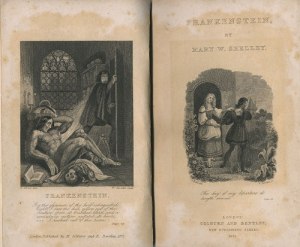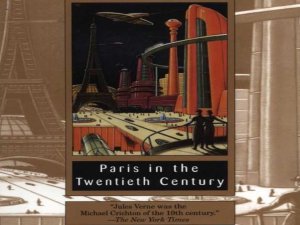Welcome to Science Fiction Sunday*, friends and dear readers. Today, I plan to start a new segment: Science Fiction History Theatre. During these segments I will be giving brief highlights from the history of science fiction instead of a review.
Before I begin, I think we should also make a quick distinction: science fiction is an entirely modern concept. Before the industrial revolution, and the advent of modern technology, there was no science fiction. The genre was a product of our burgeoning relationship with technology. That’s not to say there aren’t elements of science fiction as early as the 2nd century—they would have just been considered fantastical at the time.
 Image Courtesy: Digital Humanities Research Studio, University of Alberta
Image Courtesy: Digital Humanities Research Studio, University of Alberta
Science fiction as we know it is commonly thought to have originated with Mary Shelley’s Frankenstein; or, The Modern Prometheus (1818). Shelley’s novel was written with scientific detail in mind—according to scientific thought in 1818, it was entirely plausible to reanimate human flesh with electricity. Now we understand that to be false. In addition to plausible scientific detail, Shelley also created a plausible scientist almost 20 years before the term was actually coined in 1834.
Alongside Mary Shelley, Jules Verne was another early writer who contributed to the foundation of science fiction. Verne’s novels were characterized by engineering marvels unlike any seen at the time: giant flying balloons, massive ships, and fantastical submarines. Perhaps his most famous novel, 20,000 Leagues under the Sea features a voyage along the bottom of the ocean in a working submarine. Verne was dedicated to more than engineering marvels, however—he was also keen on writing about the future. His novel Paris in the Twentieth Century depicts Paris in 1960, or 97 years in Verne’s future.
 Image Courtesy: Business Insider
Image Courtesy: Business Insider
Shelley and Verne were joined by other writers who contributed to the foundation of science fiction as well. HG Wells (War of the Worlds, The Time Machine) and Robert Louis Stevenson (The Invisible Man) wrote numerous works of early science fiction. Together, these writers propelled science fiction towards the future where it would explode into the genre we know and love today.
For the next Science Fiction History Theatre, we’ll find ourselves deeper in science fiction’s future. Check back two weeks from now to hear about science fiction’s explosion in the pulps.
If you have any interesting tidbits from science fiction’s early years, comment below! Thanks for reading.
Stay strange, friends,
Dylan
*(By Sunday, I mean Tuesday this week! Sorry for the delay friends. Look for more posts later this week.)
